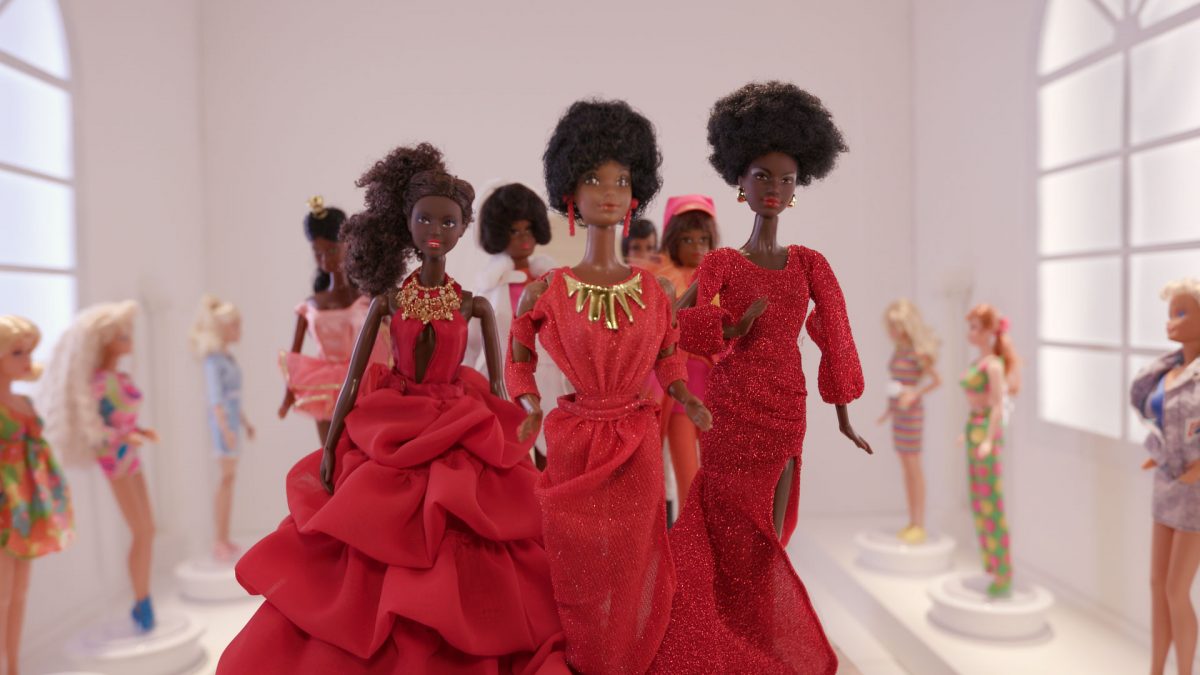The story of Lagueria Davis’ timely documentary Black Barbie is actually a part of the film. It started almost a decade ago when she moved from Fort Worth, Texas, to Los Angeles. Looking to break into the business, she asked her aunt for a place to live. Actually, “My mom asked because I was too shy, since I only met her twice as a kid, and she didn’t know me as an adult,” the director says. “She said, ‘Yes, yes, you can stay with me.’ I was like, ‘I’m pretty independent person. I’ll be with you two to three months tops.’”
Her aunt was a doll collector, and longtime employee at toymaker Mattel. Davis didn’t play with dolls very much growing up, but she was captivated by her aunt’s story of how the Black version of the Barbie doll came to be. “I was just struck by how I didn’t know about Black Barbie, and I never even thought about Black Barbie, to be honest. It was a really eye-opening conversation with her, and I was struck with the sense of history having been lived. I don’t even know if this story would be something we would read in any text or history book. These are stories from front lines, from people who’ve lived it. It’s also people who look like me who are telling me these stories, not someone with a different gaze or perspective. … My aunt is kind of the key and Black Barbie, the door which we can unlock and open and walk in to talk about these greater themes of representation as it relates to Black women and Black girls in particular.”
The film Black Barbie traces the development of the dolls, from Barbie’s meteoric rise to the top of the toy box to the various experiments with racially diverse dolls, both successful and unsuccessful, by Mattel and other toy companies. Davis tracked down Kitty Black Perkins, a fashion designer who, after designing clothes for Barbie for years, finally convinced Mattel to allow her to design a Barbie with Black skin. “Why did it take 21 years? Because that’s what was happening.”
At one point, Davis and her collaborators recreate a famous sociological experiment, which was cited in the landmark school desegregation case Brown vs. Board of Education, where children were asked their opinions of dolls with different shades of skin. “It was so fun. Our producer, Aaliyah Williams and our associate producer, Brianne Klugiewicz, they were the ones who set out to find the children. We shot it at a charter school in Los Angeles, and we put out a notice to them who then put out an APB, if you will, to other charter schools. We got submissions, and then I also put out a casting call, so to speak. And so, we got a few children from that pool of children. We worked with Dr. Amirah Saafir, who decided we should group them in threes with their peers. That makes them more comfortable, so they would be able to talk and play. We had the dolls there for them to interact with and not make it a forced choice situation, and we had a spectrum of children and dolls. Then it was just like, ‘Let’s make it conversational.’”
In addition to setting toy history straight, Davis brings a wide variety of voices on the screen to discuss the impact Barbie has had on children, race, and femininity. “I thought it was really important to have several different voices, from academia to fanatics to people who didn’t particularly see her as progressive. … I just wanted a spectrum of voices and a spectrum of thought from people who were a part of the community, but could also speak to diversity of thought within that community, because it’s not a monolithic experience.”
After working for years to create this unique documentary, Davis’ project got a big boost in interest this summer when Greta Gerwig’s Barbie unexpectedly became the biggest grossing film of the year. Black Barbie has now appeared in 75 film festivals, and was recently purchased for distribution by Shondaland and Netflix. “I felt like the story that we were laying out for Black Barbie, the doll, is very much parallel to the story of making Black Barbie, the documentary, and getting it out there. And it’s funny because I think my brain is kind of wired to connect dots.”
Black Barbie screens in competition at the Indie Memphis Film Festival Saturday, October 28th, at noon at Playhouse on the Square. Individual tickets and passes are available at the Indie Memphis website.
